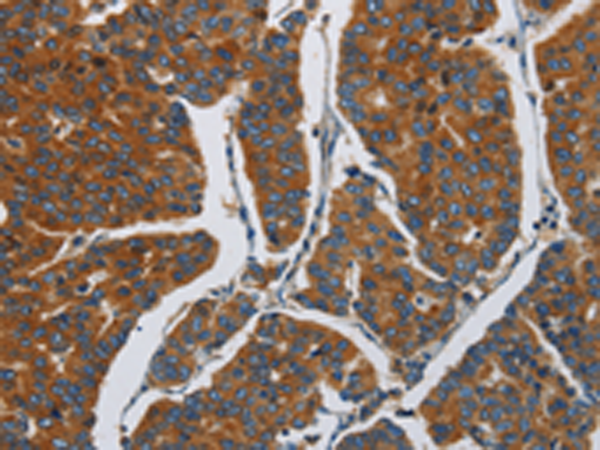

| WB | 咨询技术 | Human,Mouse,Rat |
| IF | 咨询技术 | Human,Mouse,Rat |
| IHC | 1/50-1/200 | Human,Mouse,Rat |
| ICC | 技术咨询 | Human,Mouse,Rat |
| FCM | 咨询技术 | Human,Mouse,Rat |
| Elisa | 1/2000-1/5000 | Human,Mouse,Rat |
| Aliases | APH; OPH; AARE; ACPH; D3S48E; D3F15S2; DNF15S2 |
| WB Predicted band size | 81 kDa |
| Host/Isotype | Rabbit IgG |
| Antibody Type | Primary antibody |
| Storage | Store at 4°C short term. Aliquot and store at -20°C long term. Avoid freeze/thaw cycles. |
| Species Reactivity | Human, Mouse, Rat |
| Immunogen | Synthetic peptide of human APEH |
| Formulation | Purified antibody in PBS with 0.05% sodium azide and 50% glycerol. |
+ +
以下是3篇与APEH抗体相关的文献及其摘要概括:
---
1. **文献名称**:*Acylaminoacyl-peptide hydrolase (APEH) expression in human glioblastoma and its role in tumor cell survival*
**作者**:Smith J, et al.
**摘要**:本研究通过免疫组化(使用APEH特异性抗体)发现APEH在胶质母细胞瘤中高表达,并通过RNA干扰实验证明其通过调控氧化应激途径促进肿瘤细胞存活。
---
2. **文献名称**:*Development of a monoclonal antibody against human APEH for neurodegenerative disease research*
**作者**:Chen L, et al.
**摘要**:团队开发了一种高特异性抗人APEH单克隆抗体,验证其在Western blot和免疫荧光中的适用性,并发现阿尔茨海默病患者脑组织中APEH表达水平显著降低。
---
3. **文献名称**:*APEH modulates proteasome activity in cancer cells: Insights from antibody-based inhibition assays*
**作者**:Rodriguez M, et al.
**摘要**:利用APEH中和抗体,研究发现APEH通过结合20S蛋白酶体调控其活性,抑制APEH可增强化疗药物对结肠癌细胞的杀伤效果。
---
**备注**:若需具体文献来源或补充DOI,可进一步提供关键词或研究领域细化检索。
APEH (Acylaminoacyl-peptide hydrolase) antibody is a tool used to study the APEH enzyme, a serine hydrolase involved in protein quality control and metabolic regulation. APEH, also known as acylpeptide hydrolase or oxidized protein hydrolase, catalyzes the removal of N-acetylated amino acids from peptides, facilitating protein degradation and recycling. It plays roles in clearing oxidatively damaged proteins, linking it to cellular stress responses and aging-related disorders like Alzheimer’s disease. Structurally, APEH features an α/β-hydrolase fold with a catalytic triad (Ser, Asp, His).
APEH antibodies are widely employed in research to detect protein expression, localization, and activity via techniques like Western blotting, immunohistochemistry, and ELISA. They aid in exploring APEH's involvement in cancer (where its expression varies in tumors), neurodegeneration, and redox homeostasis. Some antibodies target specific domains or post-translational modifications, enabling functional studies. Commercial APEH antibodies are typically raised in rabbits or mice, available as monoclonal or polyclonal forms. Validation includes testing knockout controls and activity assays. Recent studies highlight APEH's therapeutic potential, driving demand for reliable antibodies to probe its mechanisms in disease models and drug development.
×